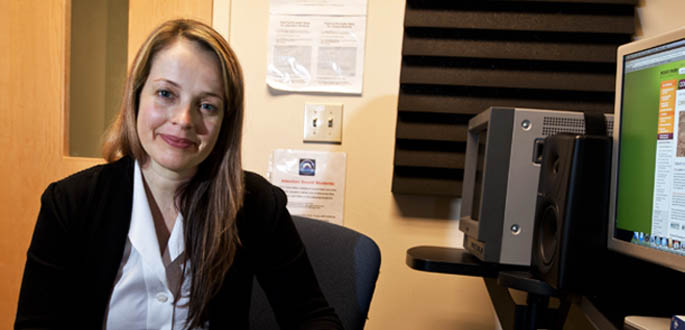Faculty profile: Meet Deirdre Maitre, Cinema Arts Friday, June 8, 2012
 Deirdre Maitre received her M.F.A. in film & media arts from Temple University in 2005. She began her career in post-production at Philo Television and Lieberman Productions in San Francisco. Since then, she has worked on many documentary and narrative projects throughout North America. In addition to teaching, Maitre does freelance work on independent films. Most recently, she served as producer and post-production supervisor on Deron Albright's award-winning feature, The Destiny of Lesser Animals, which premiered at New Directors/New Films at the Museum of Modern Art and The Lincoln Center in New York City.
Deirdre Maitre received her M.F.A. in film & media arts from Temple University in 2005. She began her career in post-production at Philo Television and Lieberman Productions in San Francisco. Since then, she has worked on many documentary and narrative projects throughout North America. In addition to teaching, Maitre does freelance work on independent films. Most recently, she served as producer and post-production supervisor on Deron Albright's award-winning feature, The Destiny of Lesser Animals, which premiered at New Directors/New Films at the Museum of Modern Art and The Lincoln Center in New York City.
Related links
- Cinema Arts program
- Equipment/Facilities
- Applying to the Conservatory
What makes Point Park's cinema arts program unique?
There are three programs within the Cinema Arts department. I teach in cinema production and it's a unique program because our emphasis is on creating compelling short stories. By completion of the program, a student has a body of narrative work that exemplifies a wide array of storytelling technique. The other major component of the program is a very practical, yet important emphasis on effective crew collaboration. Everyone, faculty and staff included, is working together to make the best student films possible from concept to completion. This unique emphasis on story and collaboration keeps the curriculum focused on what truly matters most on a production. That clarity of vision is rare, I think, at the undergraduate level.
What is your teaching philosophy?
I teach film editing and my teaching space is referred to as an edit lab. When I think of a laboratory, I think of a space that is specifically designed to encourage and facilitate experimentation, yet in a controlled, guided environment. In the labs, I focus on project-based learning and experiential learning. Students are assigned film projects that require use of a wide variety of skill and technique, as well as visual and aural textures. They present their work-in-progress regularly in our intimate, lab setting. This allows them to experiment with artistic voice and creative risk-taking without the immediate pressure of a large, anonymous audience. We share our feedback with one another and then problem-solve together. When projects are near completion, I emphasize finishing technique, which is one of my favorite concepts in post production because there are so many options, such as title design, color balancing and grading, motion graphics, compositing and sound mixing. These techniques can substantially elevate the overall production value of a film. But more important, strong finishing technique can really help draw the audience into the story and keep them there, even after the film has ended. It's quite magical to screen the final films. The students have made something that looks and sounds fantastic and that makes me quite proud.
How do you bring your professional experience into the classes you teach?
I've worked on many different types of media and what my experience has taught me is that audiences and consumers have options, especially in today's global market. I try to guide my students toward understanding their audience and its needs, as much as possible. Teaching students how to anticipate audience response with each edit, so that the edit serves the audience, is an important classroom goal for me. Practically speaking, as a post production professional it is vital to be fluent with HD work flow and media management. Not surprisingly, I have a background in IT. I bring a lot of experience in systems administration, data management and HD work flow. As a result, I work very closely with editing students on developing an effective file structure and data knowledge-base so they are confident with asset management and data conversion. That said, the technology does change quite rapidly. We could spend a whole semester learning software and hardware, but it is just as valuable to teach students sustainable skills like how to be resourceful, prepared to ask a lot of important technical questions and to research best practices for a given work flow scenario.
What advice do you have for prospective students considering a career in cinema arts?
Fall in love with the process. A successful, completed, award-winning work is exciting and rewarding, but there is a lot to be gained by learning to love and appreciate all aspects of the filmmaking process, especially the challenges and mistakes. Problem solving, perseverance, ingenuity and the capacity to listen and reflect are especially crucial in post-production.
Where have Point Park's cinema arts majors gone to work after graduation?
The degree is versatile and the skills our students acquire make them qualified to work in a broad range of electronic media production platforms. Most of our students do film/video-related internships and/or work part-time in their sophomore and junior years. Those opportunities open the gates for full-time careers in video and film production after graduation. Many go on to work on major motion pictures here in Pittsburgh or Los Angeles and New York City. Some choose to freelance on independent films, both narrative and documentary. A few join the independent filmmaking scene and develop and shoot their own feature films. A growing handful secure jobs in the commercial television/internet industry.

